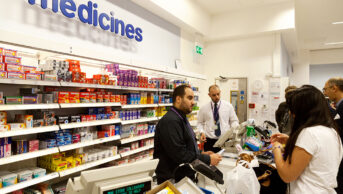
Stefan Rousseau / PA Wire / PA Images
More than 800 additional clinical pharmacists could be working in GP surgeries within the next two years, according to plans announced on 31 March 2017 by Simon Stevens, chief executive of NHS England.
‘Next steps on the NHS five year forward view’ is a new policy and strategy document for the ‘Five year forward view’ — Stevens’ blueprint for the future of the health service — which describes the progress made so far and outlines the priorities for the next few years.
More than two years after the NHS’ ‘Five year forward view’ was published on 22 October 2014, the new document promises to more than double the number of pharmacists working in GP practices from the current figure of 500 co-funded pharmacists in GP surgeries to a total of 900 by March 2018 and “over 1,300” by March 2019, it says.
NHS England adds that it expects GP surgeries to work in “hubs” or networks enabling them to share community nursing, mental health and clinical pharmacy teams and also work more closely with community pharmacists to make “fuller use of the contribution they make”.
Sandra Gidley, chair of the Royal Pharmaceutical Society’s (RPS) English Pharmacy Board, welcomes the document but says that the clinical skills of pharmacists are still an untapped resource.
“Pharmacists are the third largest health profession and can make a huge difference to patient care if better utilised and integrated in the healthcare system.”
She adds that, while some progress has been made to utilise pharmacists in GP surgeries, more could be done to make the most of community pharmacists in the prevention and early detection of illnesses, as well as in managing long-term conditions.
The National Pharmacy Association, the trade association for independent community pharmacies in the UK, shared this view in a statement. “Local pharmacies can do far more in urgent care and the management of long-term conditions, and take pressure off other parts of the system including GPs and hospitals.
“The government and NHS managers should think more radically about the potential of this uniquely accessible asset on the health service front line. Where else in the health service can you simply walk in off the street and get advice from a highly qualified professional within minutes?” the statement adds.
The document also puts focus on getting the best value out of medicines and pharmacy. As announced on 29 March 2017, NHS England is keen to encourage clinical commissioning groups (CCGs) to stop prescribing medicines that are of low clinical value or are available more cheaply over the counter.
The document also says that four regional committees will drive medicines optimisation, for example, through the use of generics and biosimilars and by reducing medicines wastage. In addition to this, formularies are now likely to be drawn up regionally, rather than at CCG level.
There will also be added pressure on hospitals to make savings on medicines, including through the list of top ten savings opportunities. NHS Improvement, which is responsible for overseeing and supporting NHS and foundation trusts, and independent providers that provide NHS-funded care, will publish and track the uptake of these, the report says, and the list will be regularly refreshed with new products or changes that deliver best value. Some aspects of pharmacy infrastructure may be consolidated between different trusts — such as medicines stores.
NHS England also wants ePrescribing pharmacists to be granted extended access to patient data by the end of 2017 via the summary care record or through local data-sharing systems.
The report adds that electronic prescriptions from NHS 111 and GP out-of-hours services will also be routed to pharmacies via the electronic prescription service. In addition, e-rostering and job planning for pharmacists will be promoted to encourage better deployment of staff and reduce spending on temporary staff.
“The benefits to the NHS of having prescribing pharmacists, with access to prescribing budgets, integrated into the wider NHS, enabled through technology and access to clinical information, is enormous,” say Gidley.
“This can happen in any setting — in hospitals, NHS 111 centres, and of course community pharmacies. We will need to make sure that pharmacists have a significant role in clinical care, regardless of where they practice as the forward view is implemented.”


